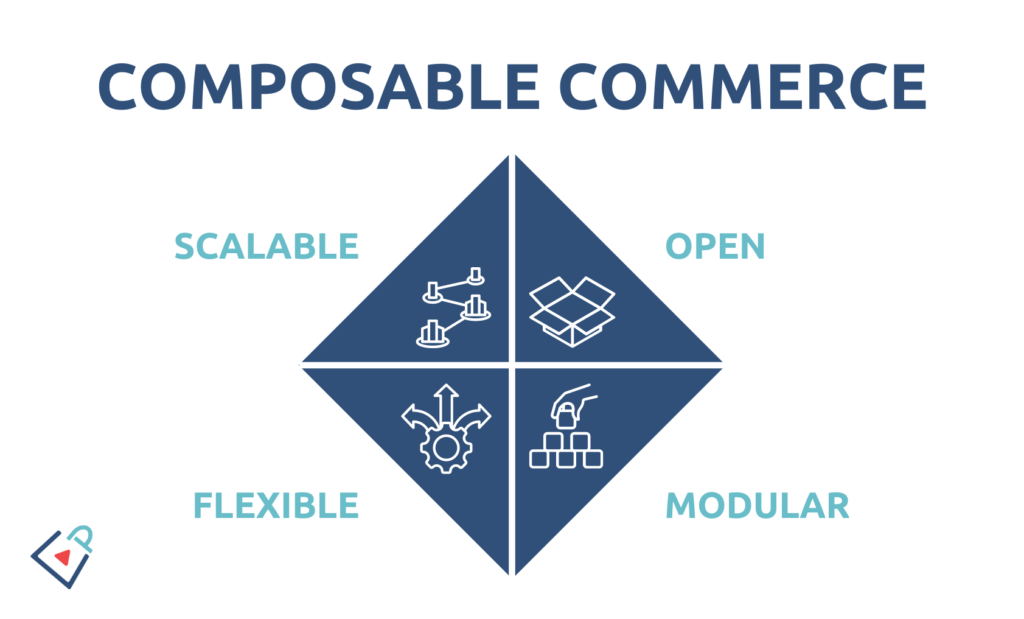Vendor lock-in occurs when a business becomes dependent on a specific vendor’s technology, making it difficult to switch to a different vendor without significant cost and disruption. This lack of standardization can be an obstacle for businesses looking to adopt modern ecommerce technology. Composable commerce is the perfect solution to reduce the risk of vendor lock-in for retailers.
In addition, it’s also important to consider the concept of portability in cloud-native ecommerce platforms. This refers to the ability to easily move data and applications from one vendor to another without needing costly and time-intensive reworks. Choosing composable commerce solutions that prioritize interoperability and portability ensures that retailers have the flexibility to switch vendors if needed, without major disruptions.
Composable Commerce and Vendor Lock-In
Composable commerce helps eliminate the risk of vendor lock-in by allowing components to be added or removed as needed. Retailers can choose vendors who best meet their current needs, rather than rely on specific vendors. The flexibility and adaptability of composable commerce help retailers avoid lock-in.
It’s important for ecommerce retailers to be aware of potential vendor lock-in and the benefits of portability when choosing future-proof ecommerce solutions. Retail businesses ensure their technology can easily adapt to changing ecommerce tech trends by prioritizing portability and mitigating the risk of vendor lock-in.

How Vendors Cause Lock-In
There are several ways that vendors can create customer lock-in for ecommerce platforms:
- Proprietary technology: Vendors may use proprietary technology that is not compatible with other systems, making it hard for retailers to replatform their ecommerce platforms with a different vendor without losing functionalities they once had.
- Custom integrations: Vendors may offer custom integrations or configurations that are tailored specifically to an ecommerce platform, making it difficult to replicate with a different vendor.
- Complex migration processes: Vendors may have complex migration processes that make it difficult and time-consuming for retailers to replatform their ecommerce platforms to a different vendor.
- Limited competition: In some cases, vendors may have limited competition in their market, making it difficult for ecommerce platforms to find alternative options.
These strategies can create vendor lock-in for ecommerce platforms. Then, it is difficult for retailers to switch their technology to a different vendor without significant cost and disruption.
Avoiding Vendor Lock-In with Composable Commerce
Here are some tips that can help retail businesses avoid vendor lock-in when selecting composable commerce vendors:
Negotiate a Fair Contract
To avoid vendor lock-in, retailers should negotiate flexible contracts. Define clear terms for ending the contract right before coming to a final agreement. Have clear answers to the following questions:
- How can we terminate your services? What steps need to be followed?
- What steps will our organization have to follow if we switch vendors in the future?
- How will you assist us in the migration or conversion process from one platform to another?
Remember to keep the answers to these questions in writing to make sure there are no confusions at the time of exit.
Build Applications That Transfer
It’s important to consider the flexibility and scalability of ecommerce platforms when evaluating vendors. Building applications that are easy to transfer and scale create future-proof solutions. Avoid hard coding and dependencies on third-party applications, and ensure that core functionalities do not depend on a specific vendor.
Protect and Own Your Data
Data is the key to success. Retailers need to own the rights to their data at all times by outlining clear terms around data ownership. Have a clear understanding of the laws to manage and maintain data correctly. Keep sensitive data in a private server or store it in a physical location to avoid any breaches.
Remember that switching vendors requires data migration as well. Ask the vendors, in the beginning, how they will assist with any future transitions. Create a clear plan on how you will migrate your data.
Implement Multi-Cloud Strategy
Implementing a multi-cloud strategy can help ecommerce platforms avoid vendor lock-in and easily migrate their data. A multi-cloud strategy gives retailers the flexibility to use multiple cloud providers. Therefore, retailers can choose the best solutions for their specific platform’s needs. They are not limited to the offerings of a single vendor. Additionally, a multi-cloud strategy can also help spread their risk across multiple providers.
Portability and Vendor Lock-in
Retailers need to consider how each vendor handles data and its level of portability when evaluating ecommerce platforms. A platform that supports multiple data storage options is ideal. This gives retailers the flexibility to adapt as their business needs change. For example, a business may need to store its data in a specific location for security or compliance reasons or may want the ability to easily migrate its data between different cloud providers.
Businesses can ensure that they have the freedom to house their data wherever it best suits their needs by selecting an ecommerce platform that is portable and flexible.
Consequences of Vendor Lock-In
A common vendor lock-in trap is the lack of awareness surrounding the potential risks and costs that can follow. Many retailers don’t realize that they are becoming locked in until it is too late and find it difficult to switch vendors without costly penalties. It’s important for businesses to be aware of potential costs that come with unexpected vendor lock-in, and carefully evaluate their options before choosing a vendor. Avoiding vendor lock-in is especially important as ecommerce technology is constantly evolving; retailers need the ability to adapt to new technologies as customer needs change.
In conclusion, composable commerce offers the benefits of an API-first, headless architecture without the worry of vendor lock-in. Its decoupled front end and back end allow retailers to benefit from a customizable tech stack. Additionally, composable commerce goes beyond simply being headless by offering personalized options for the retailer’s specific needs. Overall, composable commerce is a powerful and adaptable solution for ecommerce businesses.
Explore the benefits and features of UpStart Commerce today by starting your free trial.
